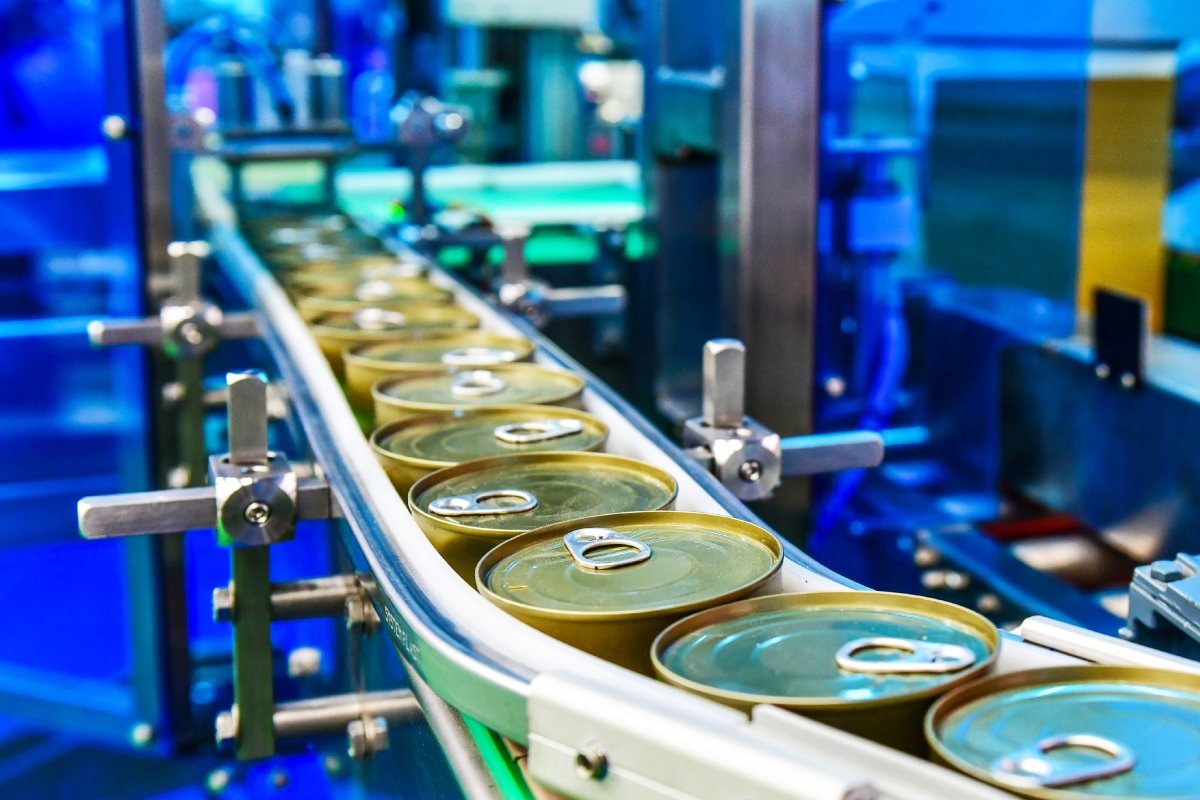
Are you considering building a small manufacturing business? It’s a good time for you to start. In the United States, as elsewhere, the number of small businesses is soaring. The entrepreneurial spirit is high, and that’s good news for the economy and employment.
Ultimately, every new business starts with a simple idea. That’s why we’ve assembled the top small business manufacturing ideas for you to consider.
These manufacturing business examples may resonate with you or inspire you to broaden your business horizons. Either way, you’ll feel empowered to blaze your own trail in the exciting manufacturing industry.
Small Manufacturing Business Examples
Getting a foot in the door of the manufacturing industry can be challenging. The easiest manufacturing business to start is one that produces products that are in high demand.
These manufacturing business examples will give you an idea of the possibilities. It’s up to you to decide which fits your vision and meets your future community’s needs.
1. Candle Making
The first of our small manufacturing business examples is candle making. This can be the best manufacturing business to start, as you don’t need too many resources and you can easily start from home.
Aromatherapy candles are especially popular, thanks to society’s renewed interest in natural therapies that reduce stress and boost wellbeing. But before you quit your job, you’ll need the basics to start your candle-making business.
You’ll have to source wax, wicks, molds, dyes, and fragrances to start making your candles.
2. General Craft-Making
Next on our list of manufacturing business examples, is craft-making. This is one of those small manufacturing business ideas that is open to interpretation. There are various types of crafts, and the production process could differ significantly from one to the next.
General craft-making includes everything from leatherworking and wood carving to weaving. You could set up a workshop in a spare room of your home or your garage. Start by selling your crafts at local craft fairs to generate interest. As sales grow, you can transition to a bigger workshop off-premises.
3. Food and Beverage Production
Foods and beverages are always in demand. We all need to eat. But it’s also a highly competitive business market. Food and beverage manufacturing requires a steady supply of ingredients, a sterile environment, and efficient packaging and bottling equipment.
To gain entry into this bustling industry, consider starting with a simple product like bottled filtered water. You could market it to local supermarkets, health stores, or even gyms.
4. Textile Manufacturing
Textile manufacturing entails spinning, weaving, and knitting fibers into fabrics. These fabrics are then used by upholsterers and clothing manufacturers to produce soft furnishings and fashion garments.
Making a name for yourself in the textile manufacturing business takes time. Meanwhile, you’ll need to acquire raw materials like cotton, linen, silk, wool, or hemp. With the right know-how, equipment, and supply chain, you can make it a success.
5. Sporting Goods Manufacturing
The US population has a great love of sports. Therefore, a sports equipment manufacturing business may be a good business to start. But if manufacturing baseball bats, basketballs, and football helmets for the sports equipment industry doesn’t appeal to you, think smaller.
Sporting goods and gyms stock more than just the obvious gear. They also often sell branded sports apparel and gym accessories. Consider starting a small business that creates these custom products, or that brands ready-made sporting goods with company and team logos.
6. Furniture Maker
The most successful small manufacturing businesses cater to people’s practical needs. Furniture making fits the bill. Handmade furniture, like custom-made cabinetry, can be both functional and attractive.
You’ll need expert woodworking skills, some good woodworking tools, and a workshop. If you find this appealing, you may have just found the inspiration for your manufacturing business. And if your business’s success relies on delivery, we can assist with a business auto loan to help finance the delivery vehicle.
7. Papermaking
Thanks to a growing demand for eco-friendly products and sustainable practices, recycled paper products are a good business to consider.
Paper products are easily recyclable, and can be turned into things like gift bags and gift boxes, stationery supplies, and so much more.
8. Health and Beauty
The health and beauty industry is showing consistent growth. Therefore, making health and beauty products is one of the more promising manufacturing business examples.
Consumers are turning away from chemical-based toiletry and personal care products to gentler, more natural alternatives. So, if you produce natural health and beauty products made from organic and herbal ingredients, you’ll be almost guaranteed success.
9. Pharmaceutical Manufacturer
Pharmaceutical manufacturers can bring in a high revenue. But this is not an entry-level manufacturing business idea. You’ll need the qualifications and knowledge to go with it. FDA regulation also comes into play with any pharmaceutical manufacturing endeavor.
That aside, the pharmaceutical industry is a noble path to follow. Pharmaceuticals contribute to people’s quality of life worldwide.
10. Chemical Production
Chemical manufacturers supply raw chemicals to various sectors including food and beverage, pharmaceuticals, and cosmetics companies. Because of the wide range of potential customers, a chemicals manufacturing business can be a real moneymaker.
But this is a lot more complex than some of the other examples on our list. Chemicals require proper handling and shipping. Investigate the correct procedures to ensure compliance with health and safety regulations.
11. Automotive Parts Manufacturing
The automotive industry in the U.S. has had to deal with high interest, inflation, decreased consumer demand, and supply chain issues. Yet the automotive parts industry has continued to grow.
People who cannot afford to buy new vehicles still need spare parts to keep their older vehicles running and roadworthy. That’s why automotive parts manufacturing is still a good business to be in.
To remain competitive, you’ll need to scale your business to allow for mass production of parts. See our guide to scaling a business further down in this article.
12. Health and Safety
Health and safety products don’t just appeal to health-conscious consumers. They are a necessity in many industrial work environments. Tap into that need, and you could have a very profitable business.
Health and safety products include safety apparel like reinforced work boots, coveralls, and gloves. But there are many other products you could make, such as safety goggles, masks, and even workplace safety signs.
13. Toy Making
Toy manufacturing can be fun and financially rewarding. There are many different types of toys, made from various materials including plastics and textiles. Therefore, you have several options available to you, from knitted toys for infants to educational toys for toddlers, and action figures for slightly older kids.
14. Plastic Manufacturer
From packaging containers to homeware, toys, personal healthcare products, and more, we are surrounded by plastics every day.
Most plastics manufacturers produce these items through injection molding and then sell the completed products wholesale to various industries. This could be a very lucrative income stream if you can manufacture plastic products at scale.
15. Electronics Manufacturing
The electronics manufacturing industry produces components for everything from the computer industry to the aerospace industry. But before you reach for the stars, you could start small by manufacturing electronic components for small-scale manufacturers of electrical consumer products.
16. Pet Food and Supplies
Every household with a pet is in constant need of pet food such as tinned dog and cat food, dog and cat food in pellet form, or packed seed mixes for birds or hamsters. You’ll need a consistent supply of raw ingredients, as well as attractive packaging to stand out from the competition.
Pet supplies also sell well. These include wooden dog kennels, leather pet collars, textile or rubber chew toys, wicker cat baskets, scratching posts, and wire hamster cages. To start, you’ll need materials like wood, leather, rope, metal wire, rubber, and textiles.
17. Microbrewery
A microbrewery is an independent manufacturer of beer, and it can be a very profitable business. You can start by producing one or two types of craft beers for local bars and pubs and later expand to a broad range of products.
Take note that you will need a brewer’s license, liquor license, and wholesale manufacturing license. Your state may have unique regulations, so be sure to check before proceeding with your brewing business.
18. Cosmetics
The cosmetics and beauty industry is always going to be a winner.
Although the cosmetics industry is dominated by a few major players, you don’t have to compete with those big brands. You can become a successful cosmetics company by focusing on natural and organic lip glosses and hair products. Find what sets you apart from the rest.
19. Coffee Roasting
Coffee roasting is probably not what you expect to find on a list of manufacturing business examples. But it’s earned its spot because coffee is a top seller. You can market your deliciously roasted coffee products to local coffee shops and restaurants, or sell them to local retailers.
20. Baked-Goods
Baked goods is one of the simplest small manufacturing businesses to start. Although it’s technically a part of the food and beverage industry, focusing exclusively on baked goods is a good entry point into this sector. It’s relatively easy to set up a small baked goods business from home at little cost.
Sell your tasty bakes at local farmers’ markets, or negotiate a partnership with a coffee shop in your area. Who knows; in time, you could expand to become a large bakery chain.
21. Bespoke Shoe Manufacturing
Everyone needs shoes, and some of us buy new pairs frequently. But mass-produced shoes often leave a lot to be desired. Bespoke shoes, on the other hand, are custom-made. They offer more discerning customers excellent craftsmanship and the highest quality materials.
Although this is a niche market, bespoke shoes are popular in more affluent segments of the market. This allows you to charge a premium price for your custom creations. You’ll need to take a shoemaking course and outsource fine-quality leather and textiles.
22. Soya Products Processing
Soya products manufacturers are some of the most profitable food processing businesses. As awareness of some of the benefits of non-animal protein sources grows, so too does the demand for products like soya chunks.
To start producing soya products, you’ll need to research how and where to get the base soy. You’ll also need food processing equipment and a sterile environment to work in. Get it right, and you can sell your products to health stores and at healthy living festivals.
23. Weaves, Wigs, and Hair Extensions
The growing market for weaves, wigs, and hair extensions has made this an exciting manufacturing business to be in. You may choose to work with human hair or synthetic fibers. Hair and beauty salons often stock such products, so they are ideal customers when starting this business.
24. Microfiber Towel Manufacturing
Microfiber cloth is known for its absorbency, softness, durability, and quick drying time. That’s why this synthetic material is in hot demand. These unique properties make it a popular choice for gym towels.
You’d need to find a source for the microfiber cloth. But with the right equipment, you could print and cut out small microfiber gym towels. Then all you’d have to do is sell them to sports supply stores and gyms.
25. Jewelry Manufacturing
Jewelry manufacturing is as old as time. Even the ancients were obsessed with adorning themselves with colorful beads and precious metals. You don’t have to be a goldsmith to produce jewelry. Costume jewelry can be made from a variety of materials, including base metals, acrylics, and plastics.
How to Start and Scale a Manufacturing Business
When you start your small manufacturing business, you will likely be focused on local or regional markets. In time, as the business grows, you may set your sights on a larger market share.
With hard work and determination, every small manufacturing business can thrive and grow. You just need to know how to build and scale your business.
Step 1: Choosing the Right Product
Starting a small manufacturing business in a niche market can be a good idea. You’ll have less competition to worry about than you would with more mainstream products. This also means you can be more optimistic in your pricing structure.
Do some market research to determine the local and regional interest in your niche product. Either local businesses must agree to stock your items, or you’ll have to sell your products directly to consumers.
Then there’s the matter of the raw materials needed. Will sourcing raw materials be easy and affordable? The more difficult it is to procure the required materials, the higher the risk of occasional delays. And the more expensive it is to get what you need, the more you’ll have to charge customers for the end products.
Step 2: Choosing the Right Location
You’ll have noticed that some of these manufacturing business examples are small-scale manufacturing business ideas. This makes them suitable for starting from home. And if you start a small manufacturing business from home, your location has already been decided for you.
This is not always feasible. Depending on the type of manufacturing business you want to build, you’ll need premises and facilities. It will become even more important as you build and scale your business. More demand for your products will mean expansion of your facilities.
Choose the right location for your business. Select an area zoned for the type of manufacture that you engage in. It should also be in or near an area where your target market lives. If you have a very broad customer base, most urban centers will be suitable. Niche markets require more careful location choices.
Step 3: Business Plan Development
Every profitable manufacturing business idea starts with a solid business plan. This is a documented strategy that outlines your business idea, mission, goals, and more importantly, how you intend to achieve them.
But it doesn’t stop there, because business development entails planning for future growth. This includes identifying new opportunities and scaling the business to take advantage of them. As your business grows, you will see the direction it is taking and gain insights into what your customers want.
Step 4: Acquiring Funding
Regardless of which of these manufacturing business examples piques your interest, you’ll need funding. This will cover everything from your initial equipment and the first batch of raw materials to everyday running costs.
Even if you manage to cross that hurdle with savings you have stowed away, it takes time to become a successful manufacturing business. At some point, you’ll need extra funding to keep afloat. A working capital loan can cover your operational expenses while you build and scale your business.
You can even use this funding for advertising and marketing campaigns. Online marketing helps businesses reach a wider audience in the increasingly digital age. You can save money while getting the word out about your products, by leveraging social media marketing opportunities.
Step 5: Securing Equipment
The manufacturing business examples listed above require vastly different equipment and tools. For smaller businesses that need more basic tools, you may be able to start with tools you already have. You could also purchase second-hand machinery for manufacturing your products.
The less you spend on the initial set-up, the better your chances for high profit margins. But you’ll need to invest in some new machinery and tools down the line as you build and scale your manufacturing company. This will enable you to leverage technological advancements and meet new industry standards.
Step 6: Hiring Skilled Labor
Many of these manufacturing business examples can be started as solo pursuits, but hiring skilled labor means you can produce high-quality products at scale. You’ll also be doing your bit for the economy, as small manufacturing businesses play a significant role in local job creation.
Step 7: Setting Up a Supply Chain
While all the manufacturing business examples we’ve provided involve different products, the rules for setting up a supply chain remain the same. In the manufacturing sector, the supply chain has multiple steps from sourcing raw materials and producing the goods to fulfilling orders and delivering them.
Review your business goals, particularly for revenue and production. Determine the necessary inventory levels to attain the desired output and the logistics for shipping and delivery. Get quotes from different logistics and courier companies and negotiate the best deal.
Step 8: Organizing Inventory Management
You’ll find it easier to organize your inventory schedule with inventory management software. You can find free basic inventory management tracking software online to get started. As your company grows, you may need to hire a stock control manager.
Step 9: Meeting Safety Regulations and Ensuring Industry Compliance
Although the manufacturing business examples in this guide serve different market segments, any manufacturing facility will need to abide by certain regulations.
Familiarize yourself with industry standards for your manufacturing processes and occupational safety regulations for your employees. As you build and scale your business, these will become even more relevant.
Getting Funding for Your Small Manufacturing Business Ideas
Even with the best manufacturing business ideas, you’ll need funding to build and scale it. E-Boost Partners facilitates access to various business loans and financial services to help you realize your business dreams.
Every manufacturing business needs sufficient working capital. This is money used for day-to-day operations, paying short-term debt, purchasing inventory, and managing your liquidity while growing the business. We help you access term loans with terms of up to 24 months.
As your small manufacturing business grows, you’ll need more advanced equipment to scale your business. We help you obtain lines of credit, to meet these crucial needs.
Hassle-free payment processing is also essential in any business. Fortunately, E-Boost Partners provides high-quality merchant services. Our credit card processing services are efficient, affordable, and free of hidden fees. That’s how to streamline your payments and keep your customers happy.
Conclusion
The above list of manufacturing business examples highlights just a few potentially lucrative manufacturing business ideas. Allow your unique interests, experience, and expertise to guide your choice.
Becoming a success in the manufacturing industry takes time, patience, and hard work. Most importantly, it takes funding. E-Boost Partners offers access to this crucial resource.
We help small business owners get the working capital term loans and lines of credit they need for their businesses to thrive. And our merchant services help businesses provide customers with professional, efficient payment systems.
Contact us for more information about any of these financial products.
FAQs
The best small manufacturing business ideas are those that meet the needs of the local population. Is there a local need for your products? If the answer is yes, you’ve got the right business idea. You’ll find it easier (and more affordable) to start your business with abundant and locally sourced materials.
Beauty and skincare products, health foods, pet care products, and fashion accessories tend to remain in high demand. But be aware that different regions have different market demographics. Research local market trends to determine what will sell best in your area.
The best time to scale is unique to every business. Starting your own business is hard work, but once it is up and running, the harder work starts. Scaling means adapting to accommodate an increased output of high-quality products to meet growing market demands. The simple answer is this: the earlier the better.










